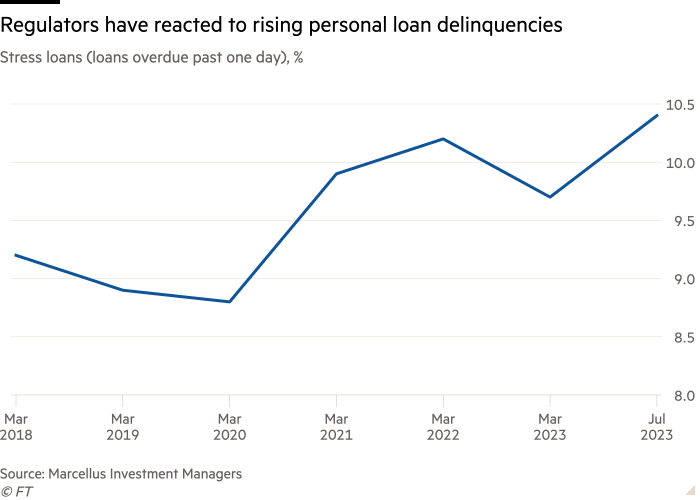[ad_1]
India’s central bank has moved to curb rising stress in the burgeoning market for unsecured consumer loans, hitting fintech lenders such as Paytm who had been increasingly relying on riskier borrowing for growth.
The Reserve Bank of India announced in November that lenders had to increase the risk weight, the minimum amount of capital they must hold in relation to the asset, for personal loans from 100 per cent to 125 per cent after data showed the share of delayed payments was rising.
The measure is designed to avert soaring consumer debt and delinquencies by pushing up the cost of capital and slowing growth for companies who have in recent years poured into higher-risk credit card or retail lending for fatter margins. RBI Governor Shaktikanta Das warned banks to avoid “all forms of exuberance” after imposing the curbs.
Since then, the shares of Paytm, one of India’s biggest fintech groups with a market capitalisation of Rs384bn ($4.6bn), have fallen more than 30 per cent, with Warren Buffett’s Berkshire Hathaway selling its 2.5 per cent stake in the company shortly after the RBI’s order. Last week, SoftBank-backed Paytm announced it would cut back on small-ticket loans below Rs50,000.
Smaller fintech lenders face an uncertain future. Another group, Zestmoney, which offered unsecured personal loans and was already struggling before the RBI’s announcement, is shutting down, according to media reports and a person familiar with the matter. Zestmoney did not respond to a request for comment.
“There were a lot of players who had mushroomed trying to do lending in the Indian digital market,” said Peeyush Dalmia, a senior partner at McKinsey, warning that the regulation would force some companies to collapse. “The more serious folks who were very focused on profitability, very focused on risk, they’ll start to benefit.”

Unsecured loans have emerged as a big growth area for businesses in India, the world’s most populous country with 1.4bn people, thanks to robust economic growth following the coronavirus pandemic. Sophisticated digital infrastructure and loose regulation led to a boom in online lenders offering loans with interest rates starting in low double-digits.
Fintech and non-bank financial lenders sprung up to cater to the millions of Indians joining the country’s credit-hungry middle class — many of whom have traditionally had limited access to the formal financial system — and looking to buy everything from refrigerators to holidays.
Banks have also expanded into personal lending. Unsecured credit card loans from banks grew nearly 30 per cent year-over-year between April and September, according to Fitch Ratings, compared to overall loan growth of 20 per cent.
This competition has forced lenders into ever riskier areas, such as rural microfinance, according to Fitch director Siddharth Goel. “Everybody was trying to get on the bandwagon and trying to lend and lend and lend,” he said. “There was a lot of equity chasing because everybody thought this was the space to be.”
But early signs that credit quality was starting to deteriorate among consumers prompted the RBI to intervene. The rate of personal loans overdue by at least a day, which has risen steadily in recent years, hit 10.4 per cent in July this year, up from 8.9 per cent in March 2019, according to Marcellus Investment Managers in Mumbai.

Bajaj Finance, one of India’s largest non-bank financial companies, said in October that it had cut small-ticket lending over signs that consumer borrowing had become “more imprudent”.
The RBI’s regulations will now require lenders to set aside a larger chunk of capital for the consumer and credit card loans they give out, limiting the amount of funds available to lend and increasing competition for loans.
“India is a credit-starved country, we’re a consumption driven country,” said Shailesh Dixit, the co-founder of Gromor Finance, which offers business loans to companies and individuals. Lenders “have to look at this much more judiciously . . . the cost of capital will go up”.
Hardika Shah, the founder of Kinara Capital, a non-bank financial company that provides unsecured business loans, said that while the RBI’s measure did not directly affect them as business lenders, it was likely to push up costs across the industry.
“The effect could be a liquidity crunch because people are rethinking,” she said. The RBI’s announcement “was a hammer coming down immediately. So obviously they must feel that the risk is large enough for them to take this kind of action this quickly.”
Analysts said that digital lenders, who often served as conduits between financial institutions and consumers, were particularly exposed. Companies such as Paytm, one of India’s oldest fintech groups, have built user bases of hundreds of millions of customers through the rapid growth of cheap digital payments but have struggled to monetise their platforms.
Paytm, which expanded into personal and merchant lending more than three years ago, announced last week that it would now prioritise higher-value loans. The company said that personal loans below Rs50,000 had become “very, very negligible” at 5 per cent of its lending portfolio or less, compared with nearly 10 per cent earlier.
But Tej Shah, a portfolio manager at Marcellus, warned that the RBI’s announcement and the slowdown in consumer lending would make it more difficult for many fintech companies.
“They have some customers but they don’t really have a business model or know how to monetise that,” he said, adding that banks were best-placed to raise more capital.
“The more sustainable model is obviously the banking model. They’ve been doing this for ages, the way it should be done under the regulatory lens. The banks will win.”
[ad_2]
Source link
